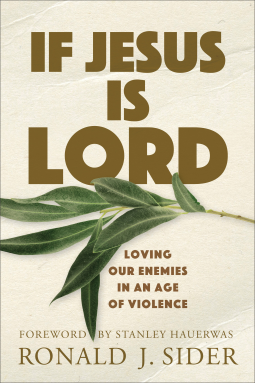
If Jesus Is Lord
Loving Our Enemies in an Age of Violence
by Ronald J. Sider
This title was previously available on NetGalley and is now archived.
Send NetGalley books directly to your Kindle or Kindle app
1
To read on a Kindle or Kindle app, please add kindle@netgalley.com as an approved email address to receive files in your Amazon account. Click here for step-by-step instructions.
2
Also find your Kindle email address within your Amazon account, and enter it here.
Pub Date Jul 16 2019 | Archive Date Nov 08 2019
Baker Academic & Brazos Press | Baker Academic
Talking about this book? Use #IfJesusIsLord #NetGalley. More hashtag tips!
Description
This book by noted theologian and bestselling author Ronald J. Sider provides a career capstone statement on biblical peacemaking. Sider makes a strong case for the view that Jesus calls his disciples to love, and never kill, their enemies. He explains that there are never only two options: to kill or to do nothing in the face of tyranny and brutality. There is always a third possibility: vigorous, nonviolent resistance. If we believe that Jesus is Lord, then we disobey him when we set aside what he taught about killing and ignore his command to love our enemies.
This thorough, comprehensive treatment of a topic of perennial concern vigorously engages with the just war tradition and issues a challenge to all Christians, especially evangelicals, to engage in biblical peacemaking. The book includes a foreword by Stanley Hauerwas.
Advance Praise
“Ron Sider has long been an authoritative, faithful, and prophetic voice on issues of Christian faithfulness. If Jesus Is Lord creates a timely and compelling challenge to all Christians. His explication of Christian nonviolence, for both individuals and society, is one of the strongest I have seen and draws a clear picture of what it means to truly follow Jesus’s beatitude ‘blessed are the peacemakers, for they shall be called the children of God.’ To live this, one of the most fundamental teachings of Jesus, is central to what it means to believe and follow Christ in our time.”—Jim Wallis, New York Times bestselling author of America’s Original Sin: Racism, White Privilege, and the Bridge to a New America, president of Sojourners, and editor-in-chief of Sojourners magazine
“Christian pacifism has no better biblical and theological apologist than Ron Sider. In If Jesus Is Lord, Sider has presented the most insightful and persuasive treatise for Christian peacemaking. Whatever your posture on war and peace, this insightful tome is a must-read!”—Gabriel Salguero, president, National Latino Evangelical Coalition; pastor, Calvario City Church, Orlando, Florida
“Sider’s sophisticated and coherent case for Christian pacifism magnifies its intellectual as well as existential appeal. War, like sin, may never be abolished. But, as Sider so eloquently argues, nonviolent resistance in the name of Jesus Christ can instigate change by enlivening the gospel with grace and power against the violence of our times.”—Lisa Sowle Cahill, Monan Professor of Theology, Boston College
“‘Jesus intended that his followers should never kill anyone!’ After you read If Jesus Is Lord, you will be able to reject this claim as unworkable in the real world, but you will not be able to dispute it. This compelling and challenging volume is the lifework of an impressive Christian ‘resistance pacifist’!”—Miroslav Volf, Yale Divinity School, director of the Yale Center for Faith and Culture, and author of For the Life of the World: Theology That Makes a Difference
“Ron Sider is rare bird among biblical interpreters: he combines well-grounded scholarly attentiveness with a lively practical passion for a world of just peace. He has, moreover, been at it for a long, grace-filled lifetime. It is no surprise then that this book comes at just the right moment for us. It is a moment in which American Christians, across the theological spectrum, are recognizing that our widely shared historical accommodation to cultural religion is a shameful failure and that we must return to Jesus’s radical core claims. Sider’s exposition of transformative pacifism is based on the cruciality of Jesus, his teaching, and the witness of his life. Many Christians will want to take a deep breath (spirit-filled breath!) with this book and embrace new resolve about being faithfully present in the world alongside Jesus. Our long-term debt to Sider is deep and beyond calculation. This book is a summons to discipleship in a way that matters.”—Walter Brueggemann, Columbia Theological Seminary
“In trademark fashion, Ron Sider once again invites Christians to consider what they say they believe. If Jesus Is Lord is a comprehensive examination of whether Jesus really meant that we should not kill. Focused on the life and teachings of Jesus, but ranging throughout Scripture, church history, and theological tradition, Sider systematically examines the arguments for and against pacifism. He concludes that nonviolent resistance, understood not as a passive alternative to just war theory, but as a proactive and creative third way, is the best interpretation of biblical teaching on how to respond to violence in our world. Sider invites readers to imagine the powerful impact of Jesus’s teaching in a world where Christians truly practiced this third way, not as a response to an occasional moral dilemma in times of armed conflict, but as a way of life. This book is for everyone. You will be a deeper, more creative pacifist, or a more thoughtful and compassionate just war theorist after reading If Jesus Is Lord.”—Shirley A. Mullen, president, Houghton College
“Ron Sider’s new book, If Jesus Is Lord, is excellent and extremely helpful thinking for our Catholic Nonviolence Initiative. It challenges us to replace simplistic ideas about nonviolent action as naive with more accurate, expanded, and evidence-based information about effective nonviolent tools as an option for resisting evil that could help humanity actually build a more peaceful world. From civil resistance to diplomacy, trauma healing to restorative justice, nonviolent civilian protection to nonviolent communication, the possibilities are legion and largely underdeveloped. Thank you, Ron Sider!”—Marie Dennis, co-president, Pax Christi International
“Over and over lone voices, the most significant being Ron Sider, have been calling Christians to think again, probe more deeply, and become more faithful to the paradigm of the cross. But that cross emerged from the teachings and life of Jesus. From Jesus’s opening sermon in Nazareth to the cross there is a consistent vision—pacifist to the core—that needs to become our vision all over again. A consistent follower of Jesus is a pacifist, and Ron Sider has demonstrated this one more time. I have been reading Sider for forty years, and this is his best case yet.”—Scot McKnight, Julius R. Mantey Professor of New Testament, Northern Seminary
“Ronald J. Sider has spent a lifetime shaking up the religious establishment, blurring the lines of Right and Left with his ‘dirty fingernails’ theology about peace and social justice. If Jesus Is Lord is yet another bold burr in the ethical saddle of the evangelical world. In this provocative and invitational examination of Jesus-centered actions for peace and reconciliation, Sider implores pacifists to be responsive to the range of legitimate critiques against them (you’re naive, simplistic, utopian), challenges just war Christians to consider that there are more than two options (kill or do nothing) to defend neighbors, and suggests with bountiful biblical and historical evidence that making peace is less costly than making war. Eminently readable, Sider’s book is a biblically based exegesis and a grace-inspired ‘third-way’ anthem for affirming a justice and Jesus-centered Christianity. Be prepared to be challenged and affirmed at every turn. Sider explores eye-opening ‘if’ questions about what it means to call ourselves Christians. He begins with, ‘If Jesus is Lord, what does it mean to embrace the full, biblical, nonviolent Christ?’ He ends with the question, ‘What if most Christians became pacifists?’ This book is relevant and impactful for Jesus followers across the spectrum who want to make a difference by reconciling beauty and brokenness in our world today.”—Susan Schultz Huxman, president and professor, Eastern Mennonite University This book is not merely a case for living as nonviolent Christians; it is a deep and spiritually formative Bible study centered on the life of Jesus. I found it intellectually expansive and emotionally compelling. No one tackles the rough issues like Ron Sider. You just can’t go on with your life as before. This book helped me draw closer to Jesus as Lord.”—Joel C. Hunter, faith community organizer; former senior pastor, Northland Church
“Ron Sider has offered a faithful, Christ-centered moral witness over his long and fruitful career. This new book gives his crowning statement: a thoughtful pacifist perspective, deeply rooted in Jesus Christ.”—David P. Gushee, Distinguished University Professor of Christian Ethics and director of the Center for Theology and Public Life, Mercer University
“A fine contribution on Jesus’s gospel of peace in relation to the Old Testament, views of the atonement, and the early church’s stance against killing. Vintage Sider!”—Willard Swartley, professor emeritus of New Testament, Associated Mennonite Biblical Seminary
“Jesus Is Lord is not a flimsy book of admonitions. Ron Sider takes oft glibly quoted commands, such as ‘love your enemies,’ and turns them on their head. His writing is challenging and biblically, historically, and theologically grounded. This is Ron Sider at his best. He has been speaking prophetically for a half century and living it out with the grace and love of Jesus.”—Jo Anne Lyon, ambassador and general superintendent emerita, The Wesleyan Church
Available Editions
| EDITION | Other Format |
| ISBN | 9780801036286 |
| PRICE | $28.00 (USD) |
| PAGES | 256 |
Links
Average rating from 5 members
Featured Reviews
 Christian W, Reviewer
Christian W, Reviewer
Goals of the Book: Ronald J. Sider is a committed Christian pacifist. In today’s violence-torn world, where we live with the repercussions of the War on Terror and watch as international relations break down, threatening war, we might have differing reactions to violence. We might wonder if we should take place in that violence in the hopes of ending it more quickly. We might wonder if we should step back from the violence in an effort to curb its rampant growth.
Sider enters the conversation from a new angle: should disciples of Jesus kill one another? He also addresses some common questions that are asked when people engage with pacifism: Are Christians called to stand by and watch evil happen? Or is there a third way to non-violently deal with violence and aggression?
The book brings the reader to the biblical text and Christian theology to build a well-rounded foundation for a pacifist mindset. The book also helpfully engages with both critiques against pacifism (critiques that he has either heard or foresees) and critiques against Just War theory (critiques which he personally levels against Just War theory).
Why Should You Care?: Well, primarily, you should care because, if Sider’s proposals are true, it’s an issue of Christoformity and the gospel. If the Gospel creates peace in the world, then it should cause Christians now to be non-violent. If Christians are acting violently, we may be acting in opposition of the gospel of the kingdom.
We are also called to act in conformity with how Christ acted in his earthly ministry. The first couple of chapters deal with Jesus’ ministry, character, and teachings. First, we see how Jesus reshaped and challenged his contemporary Jews’ views of the Messiah. Sider then looks into Jesus’ teachings, expanding on how many of them point us away from violence toward peace with one another coming out of the peace that we have with God. He then shows how the entirety of the New Testament is based on this peace as well, and explains that to be consistent with the New Testament witness, we should pursue lives of peace and non-violence.
Book’s Strengths and Weaknesses: One thing I appreciated about this book is that it refused to deal with broad and generic questions while refusing to put forward broad and unhelpful answers. For example, when speaking about Jesus, he gives specific examples when we might think Jesus was justified in committing violence. “Does Jesus’s actions tell us anything about his thinking on violence? We must examine the story about Jesus’s temptations by Satan; his refusal to become king; the triumphal entry; and the rejection, just before his arrest, of defense by legions of angels.” He also addresses specific Bible texts toward building a case for pacifism while addressing those which might be used to dismiss pacifism. This will bolster future conversations for pacifists who may struggle to defend their point while helping anybody understand the pacifist view as a well-rounded and fully developed worldview.
One thing that I found personally odd was the arrangement of the book. Broadly, the book is arranged as “Jesus as example/his teachings; the New Testament’s teachings; criticisms against pacifism; foundational theological issues toward pacifism; critiques against pacifism; back to theological issues with regards to pacifism”. This felt a bit disjointed to me, and I wonder why the biblical texts and theological issues weren’t closer together, without the anti-pacifist critiques in the middle. I would have loved to see greater connections toward building a far more solid argument that could be followed from page one to the end.
I would recommend this book to anybody with questions on pacifism or living a pacifist life. But more importantly, I might be more excited to present this book to Christians who think that violence is justifiable for disciples of Jesus. Despite some editing quibbles, I think this book will serve the church well and address many issues coherently and intelligently.
 Carl J, Reviewer
Carl J, Reviewer
Though I have a few Sider books, this is the first of his I've actually read (welcome to the world of my Anti-Library). I admit going into this that I am already someone who holds a position of Christian non-violence and so this book is not one that I'm approaching to convince me of it. I do believe it would make a pretty good starter point for those investigating Christian non-violence and introduce them to plenty of other resources.for further study.
The first five chapters are a basic overview of of what we find in the New Testament concerning peace and the Christian response to violence by looking at the life and teaching of Jesus with a bigger focus on the Sermon on the Mount, and then a look at the rest of the New Testament. Sider then goes more onto the defense by approach pacifism by answering hypotheticals, recognizing some of the theological and ethic challenges pacifism brings, and also looking at the problems with Just War theory and trying to tackle the problem of killing in the Old Testament. He closes the book with a few "random" chapters of left over topics such as what might happen in the world if the vast majority of Christians acted as pacifists, how does non-violence fit in with atonement theories of pacifism in church history, both in denominations and in individuals.
The opening five chapters were a good primer, but also a bit boring at times, though I did enjoy his approach to the Sermon on the Mount. I did feel like he was a little too uncertain in many things and took more of a "Well it could be this, but maybe not" which, at least to me lacked a bit of "punch", but at the same time I appreciate the humility in this topic as well with the understanding of not knowing it all. This also is present in looking at some of the perceived problems of pacifism and Sider's way of masterfully handling them.
I had two favorite chapters. One was on atonement theories and if they mesh well with pacifism given the violence of the cross. The other was on violence in the Old Testament. In the latter Sider explores a number of approaches up to even modern ideas to deal with the violence. In the end (spoiler alert) Sider admits that none of these really work and that he doesn't have a great idea of how to reconcile the violence of the Old Testament, but that ultimately this issue is one that starts at Jesus, not the Old Testament.
The final one was also important to me. Part of it looks at the history of many denominations that started off with strong pacifist convictions but either changed with culture or gave into pressure to stay out of trouble with the powers that be. After that though Sider lists a number of Christians throughout history who have been strong in their pacifism which I enjoyed as a means to let me know that my stance is not one that is not without credibility.
A copy of this book was provided to me by Netgalley in exchange for an honest review.
 Paul M, Reviewer
Paul M, Reviewer
Ron Sider has been challenging Christians' thinking since at least 1977, when has controversial classic Rich Christians in an Age of Hunger was published. Here's what I love about Sider: unlike many people who write from the "Christian left," I have no doubt that Sider is writing as an Evangelical, Bible-believing, Jesus-loving Christian. This is why, even though I don't fully embrace his conclusions in If Jesus is Lord: Loving Our Enemies in an Age of Violence, I can thoroughly recommend it for anyone grappling with the question of Christian pacifism.
If you are a follower of Christ, grappling is what you must do with If Jesus is Lord. As a Christian pacifist, Sider asserts that "it is simply contrary to the facts of history to say that there are only two options: to kill or do nothing in the face of tyranny or brutality." Giving specific examples from the Sermon on the Mount, Sider shows that "the commanded response is neither violent nor passive. Jesus calls his disciples not to turn aside passively or hit back but rather to confront the evil nonviolently."
This third way is the application of Jesus' pacifism. But the core is more simple: Jesus said "Love your enemies." Sider points out that loving your enemies while you are trying to kill them is really difficult. Sider does not see "how it is possible to seek to kill people and at the same time be engaged in inviting them to accept Christ." In terms of violence, there is little question as to Jesus' perspective. "Jesus's actions and teaching reject the use of violence. And he seems to expect his disciples to do the same. . . . The evidence of the New Testament is quite clear. Jesus called his followers to love their enemies, not kill them."
I am not prone to violence, and I have never served in the military. But I have always tended to support the military and police, with the necessary violence that those roles infer, and have always thought that one might, when faced with personal violence, be justified in a violent response. Sider reviews and debunks Just War theory, and makes a strong case for pacifism based on Jesus' life and teaching. But as much as he made me think and challenged my previous notions on violence, I don't feel like he adequately answered the questions, What are we to do in the face of a figure like Hitler? Or, What am I to do in the face of an individual threatening immediate violence to my family? Never having faced that situation, the third way does elude me. . . . Nevertheless, I am grateful to Sider's calling me to deeper faith and deeper, more faithful thought about violence.
Thanks to NetGalley and the publisher for the complimentary electronic review copy!
 Julia B, Reviewer
Julia B, Reviewer
I appreciated Sider's outlook and reasonable, clear approach on Christian pacifism. While I may not agree with everything he said, he had a clear, articulate approach and presented clear arguments. I would recommend this book to anyone who's looking to understand pacifism and the approaches to war and violence from a Christian perspective.












